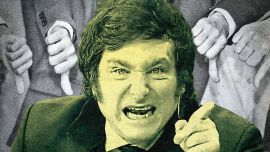The leader of a separatist movement on the remote island of Annobón, part of Equatorial Guinea, has asked Argentina to recognise its self-declared independence, citing historical ties from the colonial era.
Orlando Cartagena Lagar, who heads the Ambo Legadu (“Free Annobón”) movement, said the demand was based on the island's former administrative link to the 18th-century viceroyalty of the Río de la Plata, a Spanish colonial territory that included present-day Argentina, Bolivia, Paraguay, Uruguay and parts of Brazil and Chile.
In view of "this shared historical link," we have "requested Argentina’s support, its recognition of our country, our movement and our struggle for freedom," he said in an interview on Monday from Spain, where he has lived for the past 30 years.
Cartagena Lagar visited Argentina in April, where he said he gained visibility for his campaign. But it seems unlikely Buenos Aires is going to back his claim.
Annobón, a volcanic island of 17 square kilometres (6.5 square miles) with a population of about 5,000, became part of Equatorial Guinea when the small central African country gained independence from Spain in 1968.
The Ambo Legadu movement unilaterally declared Annobón independent from Equatorial Guinea in July 2022.
Cartagena Laga accused Equatorial Guinea's longtime president, Teodoro Obiang Nguema Mbasogo, of carrying out a "slow genocide" on the island, which he said face chromic shortages of electricity, clean water and food.
Residents are “subjected to brutal pressure from the Guinean Army,” said Cartagena Lagar.
"People are dying of hunger, even if it’s not shown on television. Children are being born with deformities,” he said.
Cartagena Laga stressed Annobón was not seeking to become part of any other country.
"We don't want to leave a dictatorship that is killing us just to become subjects of another country," he added.
“We are not asking to become an Argentine province. We are asking for political support to free ourselves from a fierce dictatorship,” Cartagena Laga told Radio Rivadavia in a separate interview.
“We are united by a common colonial history. We speak Spanish. But more than that, we share the experience of subjugation and the will for freedom,” he said.
Equatorial Guinea, a nation of around 1.5 million people, has been ruled with an iron first since 1979 by Obiang, 82, one of the world’s longest-serving heads of state.
Annobonese people accused the central government of marginalising them.
Access to Annobón – located some 350 kilometres (220 miles) southwest of Malabo, the capital of Equatorial Guinea – is limited to a private plane or a ferry that operates just twice a month.
In August 2024, rights group Access Now called for the restoration of Internet and telephone services on the island after they were suspended following protests against infrastructure projects.
– TIMES/AFP/NA
























Comments